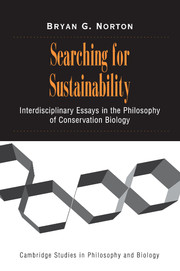Book contents
- Frontmatter
- Contents
- Searching for Sustainability
- General Introduction: An Interdisciplinary Experiment
- I PRAGMATISM AS AN ENVIRONMENTAL PHILOSOPHY
- II SCIENCE, POLICY, AND POLICY SCIENCE
- III ECONOMICS AND ENVIRONMENTAL SUSTAINABILITY
- 10 Sustainability, Human Welfare, and Ecosystem Health
- 11 Economists' Preferences and the Preferences of Economists
- 12 Evaluating Ecosystem States: Two Competing Paradigms
- 13 Sustainability: Ecological and Economic Perspectives, with Michael A. Toman
- 14 The Evolution of Preferences: Why ‘Sovereign’ Preferences May Not Lead to Sustainable Policies and What to Do about It, with Robert Constanza and Richard C. Bishop
- IV SCALING SUSTAINABILITY: ECOLOGY AS IF HUMANS MATTERED
- V SOME ELEMENTS OF A PHILOSOPHY OF SUSTAINABLE LIVING
- VI VALUING SUSTAINABILITY: TOWARD A MORE COMPREHENSIVE APPROACH TO ENVIRONMENTAL EVALUATION
- Index
- References
10 - Sustainability, Human Welfare, and Ecosystem Health
Published online by Cambridge University Press: 21 January 2010
- Frontmatter
- Contents
- Searching for Sustainability
- General Introduction: An Interdisciplinary Experiment
- I PRAGMATISM AS AN ENVIRONMENTAL PHILOSOPHY
- II SCIENCE, POLICY, AND POLICY SCIENCE
- III ECONOMICS AND ENVIRONMENTAL SUSTAINABILITY
- 10 Sustainability, Human Welfare, and Ecosystem Health
- 11 Economists' Preferences and the Preferences of Economists
- 12 Evaluating Ecosystem States: Two Competing Paradigms
- 13 Sustainability: Ecological and Economic Perspectives, with Michael A. Toman
- 14 The Evolution of Preferences: Why ‘Sovereign’ Preferences May Not Lead to Sustainable Policies and What to Do about It, with Robert Constanza and Richard C. Bishop
- IV SCALING SUSTAINABILITY: ECOLOGY AS IF HUMANS MATTERED
- V SOME ELEMENTS OF A PHILOSOPHY OF SUSTAINABLE LIVING
- VI VALUING SUSTAINABILITY: TOWARD A MORE COMPREHENSIVE APPROACH TO ENVIRONMENTAL EVALUATION
- Index
- References
Summary
The goal of ‘sustainability’ has emerged as a rallying cry for a broad spectrum of advocates of both environmentalism and rational development. The term sustainability was first popularized in the field of resource use, and it initially had a fairly precise application in phrases such as ‘maximum sustainable yield’, which represents the highest level of exploitation consistent with maintaining a steady flow of resources from a forest or fishery. Today, however, the term is used much more broadly to include, for example, levels of pollution and degradation of natural systems that are consistent with maintaining current levels of use and enjoyment of those systems. In the context of ‘sustainable development’, it must be used in the broader sense, and hence it is in this broader sense that the term has become a shibboleth of mainstream environmentalists.
It is no doubt useful, in policy discussions, to have a term like ‘sustainability’, which, like ‘conservation’ in days of old, can stand as a label for the many activities of environmentalists. The danger is that the term, like ‘conservation’ before it, will become a cliché. Nobody opposes it because nobody knows exactly what it entails. To avoid this trap it will be necessary for environmentalists, with the help of scientists and philosphers, to develop, explain and justify a theory of environmental practice that gives form and specificity to the goal of sustainability.
- Type
- Chapter
- Information
- Searching for SustainabilityInterdisciplinary Essays in the Philosophy of Conservation Biology, pp. 168 - 182Publisher: Cambridge University PressPrint publication year: 2002

